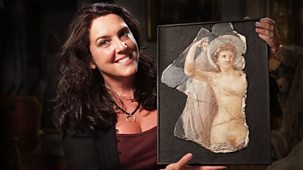
Episode 14 February 2019
In 1914, the suffragette Mary Richardson attacked the Rokeby Venus at the National Gallery in London. But why did this painting fire such outrage? Professor Bettany Hughes embarks on a voyage of discovery to reveal the truth behind the Venus depicted in the painting, proving that this mythological figure is so much more than just an excuse for sensual nudity and chocolate-box romance. Because Venus Uncovered is the remarkable story of one of antiquity's most potent forces. And more than that - hers is the story of human desire, and how desire transforms who we are and how we behave.\n\nCharting Venus's origins in powerful ancient deities, Bettany demonstrates that Venus is far more complex than first meets the eye. Beginning in Cyprus, the goddess's mythical birthplace, Bettany decodes Venus's relationship to the Greek goddess Aphrodite, and, in turn, Aphrodite's mixed-up origins both as a Cypriot spirit of fertility and procreation - but also, as a descendant of the prehistoric war goddesses of the Near and Middle East, Ishtar, Inanna and Astarte. We start to see the Venus is about desire of all kinds - malign as well as benign. Hughes meets world experts who reveal the mysterious and obscure ways this ancient goddess was imagined and worshipped (including as a bearded, gender-fluid woman and even as a giant, sinister, volcanic rock), and visits the sites where the real women and men of the Bronze Age adored her as 'greater than a god' - a creature who gave all and took all away. Bettany - who has been investigating Aphrodite for over a decade - looks into the goddess's own love life to see that - even for her - tangling with another was often bittersweet. We hear the heartfelt, 2,600-year-old poems of Aphrodite's acolyte, the female poet Sappho - begging the question, does passion always generate both pain and pleasure?\n\nA far cry from the soft, nude female form we are now accustomed to, we see the war-like, martially-clad Venus worshipped in Rome by Julius Caesar and emulated by the Egyptian queen Cleopatra. Down the generations, Venus has been a constantly evolving figure. She is genuinely immortal - a goddess who refuses to lie down and die. From Stone Age Mediterranean cultures to an 18th-century, Venus-themed British stately home - frequented by high-ranking politicians and aristocrats - Venus represents the power of lust, and of hate as well as love.\n\nThrough ancient art, evocative myth, exciting archaeological revelations and philosophical explorations Bettany reveals how this immortal goddess endures through to the 21st century, and what her story and journey through time reveals about what matters to us as humans. Uncovering Venus - she shows us why we still need to care about this primordial companion on the human journey - and how we trivialise her power at our peril.
Source: BBC 4
Most recent episodes of Venus Uncovered: Ancient Goddess of Love
Venus Uncovered: Ancient Goddess Of Love
Episode 14-02-2019
In 1914, the suffragette Mary Richardson attacked the Rokeby Venus at the National Gallery in London. But why did this painting fire such outrage? Professor Bettany Hughes embar ...
14-02-2019
BBC 4
Most popular episodes of Venus Uncovered: Ancient Goddess of Love
Venus Uncovered: Ancient Goddess Of Love
Episode 14-02-2019
In 1914, the suffragette Mary Richardson attacked the Rokeby Venus at the National Gallery in London. But why did this painting fire such outrage? Professor Bettany Hughes embar ...
14-02-2019
BBC 4

